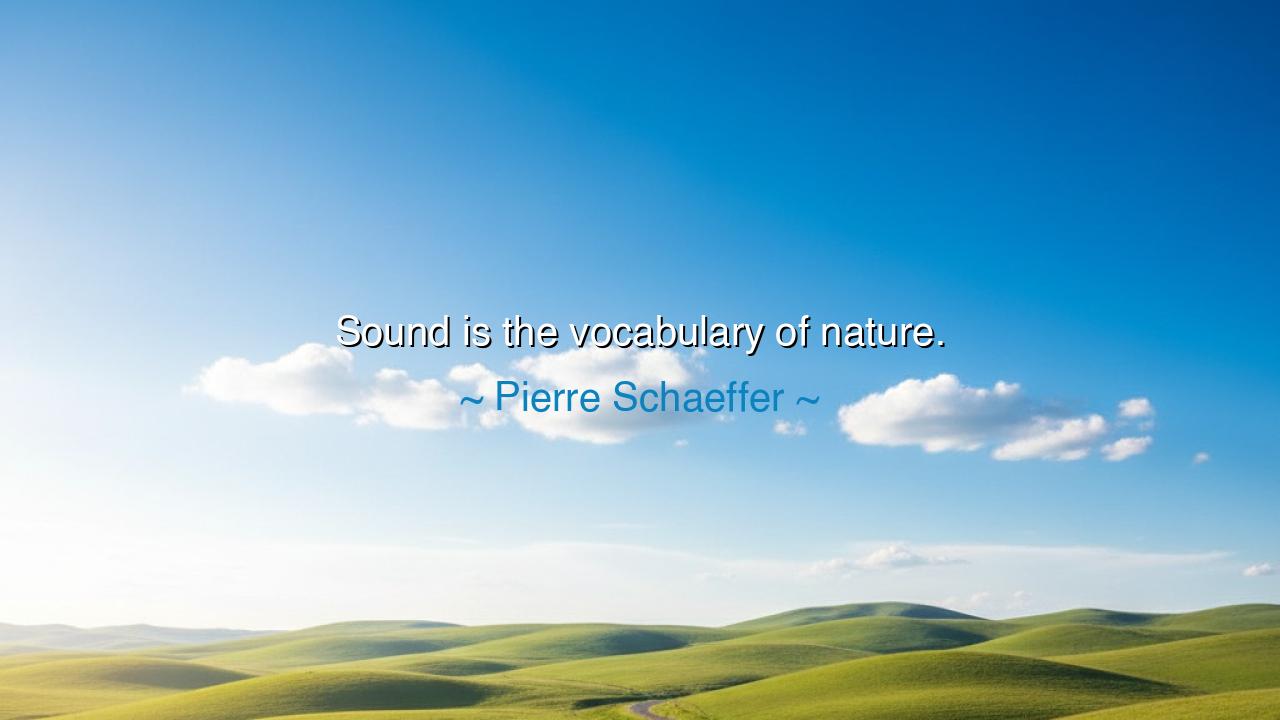
Sound is the vocabulary of nature.






Pierre Schaeffer, pioneer of musique concrète and visionary of sound, once proclaimed: “Sound is the vocabulary of nature.” In this utterance lies a truth as ancient as the earth itself: that before there was writing, before there was speech, there was sound — the murmur of waters, the whisper of winds, the cry of beasts, the thunder of storms. These were the first words ever spoken to humanity, the eternal language of nature that shaped the senses and stirred the soul. To hear this vocabulary is to remember that we are children of the earth, and that every note in the world around us carries meaning.
The origin of Schaeffer’s wisdom lies in his work as both composer and thinker. He sought to capture the voices of the world not merely through instruments, but through the raw sounds of reality: the clatter of trains, the hum of machines, the chirping of birds. To him, sound was not noise, but message. It was the true vocabulary by which nature speaks, and if we train our ears, we may come to understand her grammar. This idea stretches back to the ancients, who believed the world itself was a harmony, a music of the spheres, whose sounds reflected divine order. Schaeffer clothed this ancient belief in modern form, reminding us that every vibration is a word, every echo a sentence, every resonance a truth.
History offers us striking examples of this lesson. Think of the sailors of old, who learned to read the sounds of the sea — the roar of distant waves against unseen shores, the creak of sails warning of strain, the cry of seabirds signaling land. These sounds were their vocabulary, their survival, their guide across unknown waters. They did not dismiss the voice of nature as meaningless, but listened with reverence, for in it they found direction and destiny.
Or recall the story of Ludwig van Beethoven, who, though deaf in his later years, continued to compose symphonies that seemed to echo the very voice of nature itself. How could he, bereft of hearing, write the “Pastoral Symphony,” in which the murmur of streams and the singing of birds live again in music? It was because he had once learned the vocabulary of sound so deeply that even silence could not strip it from him. In his memory, the world still spoke, and he translated its whispers into immortal music.
The lesson is clear: to live well, we must learn to listen. Too often, modern life drowns us in man-made noise, and we forget the eternal vocabulary that still surrounds us. The rustle of leaves tells of the wind’s passage. The call of a bird tells of seasons turning. The silence of a night sky tells of peace. These are not random occurrences; they are the words of nature, speaking patiently to those who will pause to hear.
What, then, shall we practice? Go into the fields, into the woods, by the rivers, and open your ears. Listen as though the world were a teacher, and you its student. Let the sounds you hear shape your spirit — the crash of thunder teaching awe, the song of birds teaching joy, the whisper of wind teaching humility. Carry this practice into daily life: listen deeply to people, to moments, to the quiet between words. For the art of listening to nature’s vocabulary is also the art of listening to one another.
Therefore, O seekers of wisdom, remember Schaeffer’s words: “Sound is the vocabulary of nature.” Do not let the language of the earth be forgotten. Train your ears to hear the messages around you, for they are older than books, older than speech, and wiser than any single man. To hear the world is to know that you are part of it, woven into its music, carried in its song. And when you live by listening, you will find that the earth itself is a teacher, and every sound is a word written upon your soul.






AAdministratorAdministrator
Welcome, honored guests. Please leave a comment, we will respond soon